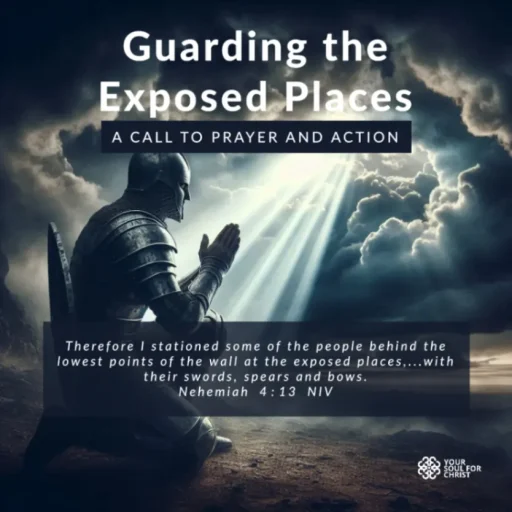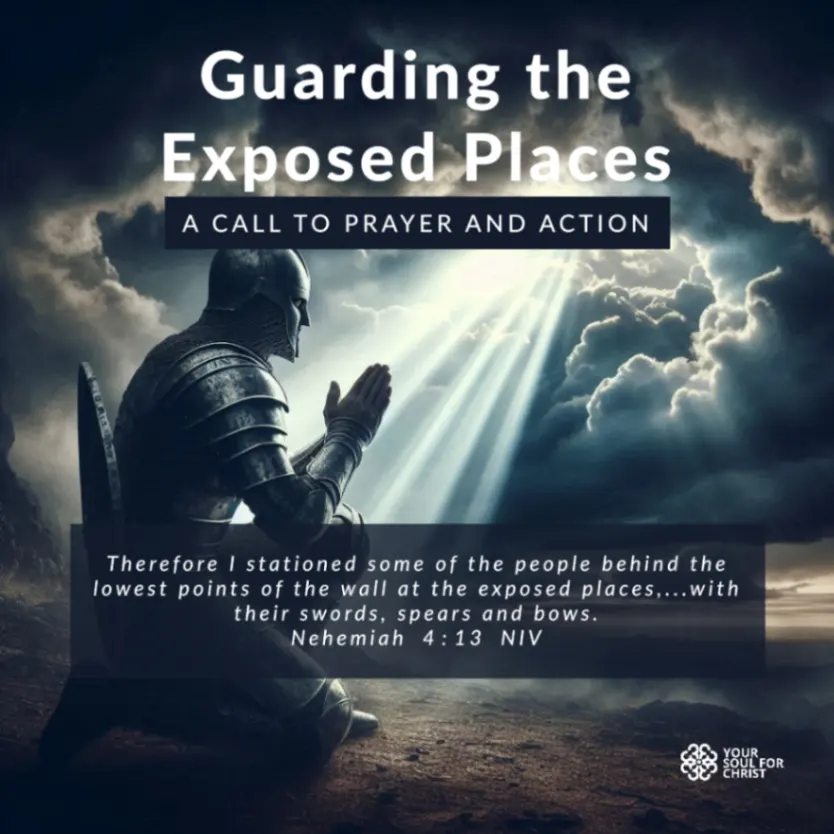Therefore I stationed some of the people behind the lowest points of the wall at the exposed places, posting them by families, with their swords, spears and bows.
Nehemiah 4:13 NIV
Every journey of obedience to God will, at some point, encounter resistance. The very act of stepping into purpose or rebuilding what has been broken often draws opposition. This truth is powerfully illustrated in the story of Nehemiah. As he led the Israelites in restoring the walls of Jerusalem, he faced constant attacks from adversaries like Sanballat and Tobiah—men determined to derail the work. The more they built, the more the enemy sought to discourage and disrupt. Yet, through it all, one thing stood out: Nehemiah’s awareness of the exposed places.
In Nehemiah chapter 4, verse 9 reveals a pivotal response to opposition: “But we prayed to our God and posted a guard day and night to meet this threat.” Rather than succumbing to fear, Nehemiah and his people turned to God. They did not allow panic to overtake their purpose. They acknowledged the threat but chose prayer over despair. This was not a passive cry for help; it was a declaration of trust in God’s protection and wisdom.
What strikes me deeply here is their balance of faith and action. Their spiritual posture was one of dependency on God, but they also took practical steps. They didn’t just pray—they posted guards. They recognised that while God is our ultimate defence, He often calls us to play a part in guarding what He’s given us.
Later in the chapter, Nehemiah identifies a deeper vulnerability. In verse 13 we read: “Therefore I stationed some of the people behind the lowest points of the wall at the exposed places…with their swords, spears and bows.” The word exposed here speaks volumes. These were areas most susceptible to attack—weak points that required not just attention, but action.
This is where many of us, even as believers, fall short. We are quick to pray, but slow to act on what prayer reveals. We ignore our weaknesses, hoping that spiritual effort alone will be enough. Yet Jesus Himself warned us, “The spirit is willing, but the flesh is weak” (Matthew 26:41). Ignoring our exposed places doesn’t make them go away—it only leaves them unguarded. And it makes us vulnerable.
The lesson from Nehemiah is clear: don’t overlook the exposed areas in your life. Identify them. Guard them. These may be areas of repeated temptation, emotional triggers, unchecked habits, or strained relationships. For me, it’s been a journey of learning where I’m most vulnerable and refusing to pretend those places are impenetrable. God doesn’t ask just us to be perfect—He asks us to be honest. And when we are, He equips us to protect those areas with wisdom, discipline, and accountability.
To guard the exposed places might mean setting firm boundaries or stepping back from influences that weaken your spiritual focus. It might mean seeking counsel, investing time in the Word, or removing things that stir up the wrong desires. It might also mean putting an end to certain relationships. Whatever the action, the aim is the same: protect what God is building in you.
Nehemiah shows us that rebuilding anything of value—be it a life, a calling, or a relationship—requires more than just zeal. It demands watchfulness. Prayer is our first weapon, but practical defence is just as necessary. We’re called to be builders who also know how to battle, warriors who are wise enough to guard the places where the wall is thin.
May we learn from Nehemiah’s wisdom. May we be people who pray without ceasing and act with intention. Above all, may we never be afraid to confront our exposed places, trusting that with God’s help, those very areas can become fortified and strong.

